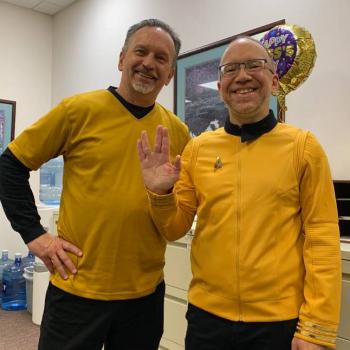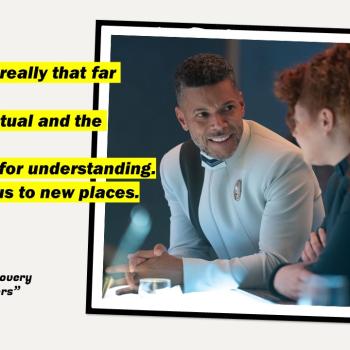I really enjoyed watching the three-episode SyFy miniseries Childhood’s End, based on the novel by Arthur C. Clarke of the same title. It is theologically, emotionally, and ethically rich material that explores ideas about God and mortality in a serious, interesting, and provocative way. I highly recommend it.
The story begins with ships arriving in our skies, which is a standard trope of alien invasion. The voice that comes from above insists that it belongs to the supervisor of Earth, and that he is not there as a conqueror but as an enabler – but of course, that is what conquerors often say.
As the beings who remain unseen, and begin to be referred to as overlords, start insisting that things like injustice and war end, the question of whether they think they’re gods or have destroyed God is spoken about explicitly. The supervisor of Earth, Karellen, chooses a man named Ricky as his spokesperson, and soon he is nicknamed the “blue collar prophet.”
15 years pass before Karellen shows himself to a world that has been transformed by peace and health. He looks like the stereotypical image of the Devil. There is only a little discussion of how to explain this resemblance in the series. Milo Rodericks, a scientist who had been healed as a child by the overlords, suggests that there is some sort of psychic connection among people and beyond, and that somehow humans knew the overlords were coming and feared it. But why should they?
We eventually learn the answer to that question. The arrival of the overlords brings about rapid changes in the next generation, with one child chosen even before she is born to be the focal point, the conduit of communication between all human children, who have become linked telepathically, and a higher power.
Milo stows away aboard an overlord ship, and gets to meet this higher power, the overmind, whom the overlords serve. This is the collective consciousness of all living things in the universe that have reached the stage of being able to unite with them. Milo asks incredulously, “So we’re God?” and the reply is no – but the children are.
The heart of the theological and ethical exploration of the story focuses on what we hope for. Ricky is stuck in some ways in a moment in the past, with his former fiancee who died of cancer. But given the chance to stay reliving that moment forever, Ricky decides he prefers the present, reality, even with the death that will ensue. He and his current wife were unable to have children, and we later learn that Karellen had made them sterile to spare them. Once the children are taken – in a rapture-like ascension – no more children will be born to humans. The departure of the children to unite with God, in essence, also marks the end of any point to humanity as it had existed up until that point. The big question is why we react with such unhappiness at this scenario. It was always the case that the children were our hope, our future. And yet rather than rejoice that they reach this key turning point in the next generation rather than some distant future, we regret and mourn the loss of them, as well as the lack of any real meaning for ourselves as far as the ongoing existence of adults is concerned.
There are moments that are especially moving – from the suggestion Milo makes that cookie dough ice cream is an example of humanity’s distinctive accomplishments, to his desperate plea that they save some aspect of human culture as it had previously existed, and they preserve Ralph Vaughan Williams’ “The Lark Ascending.”
Did you watch the miniseries? Have you read the book? What did you think of the TV version, either in light of Clarke’s novel or considered on its own? And what do you think of this science fictional exploration of an interesting theological possibility?














